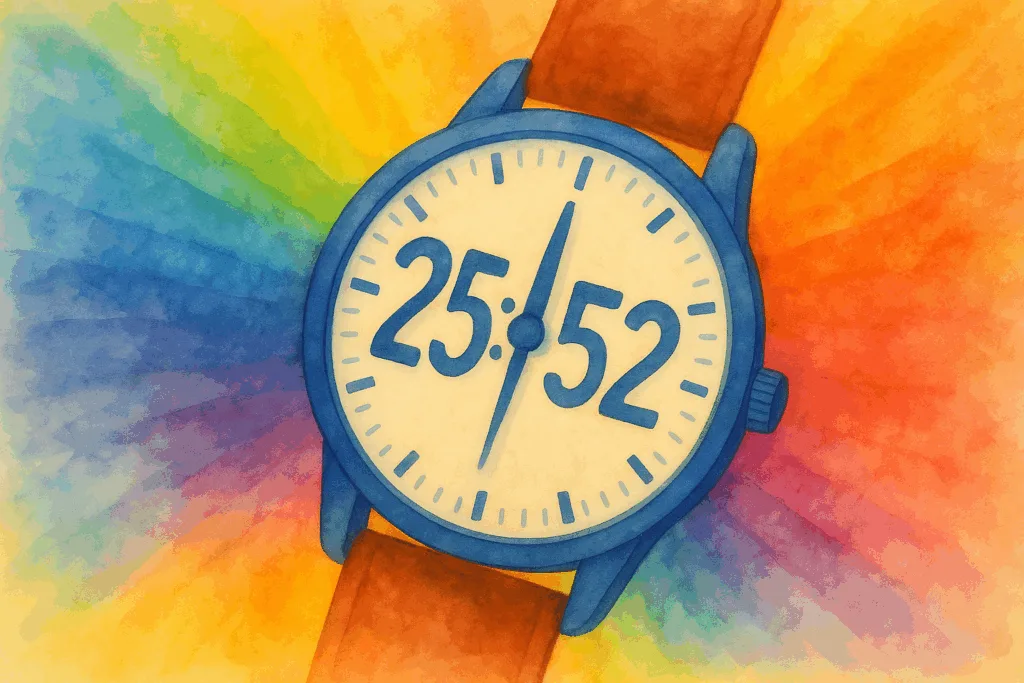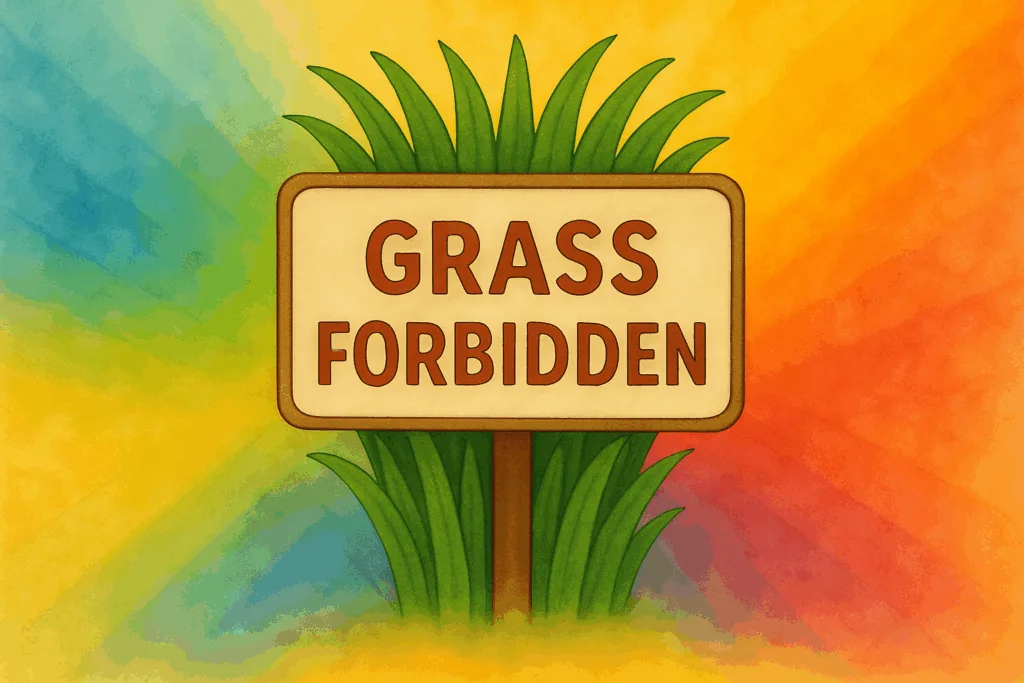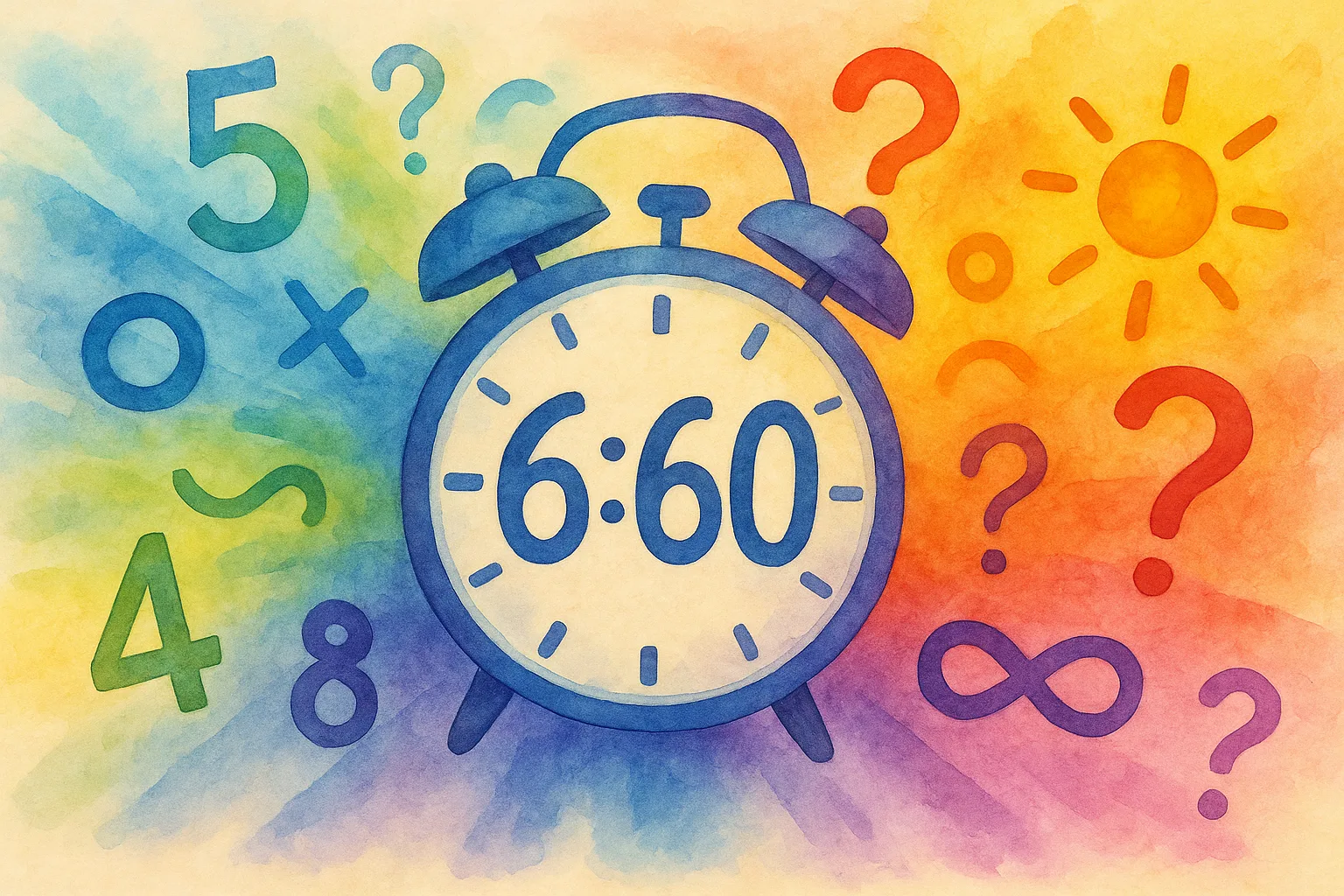Over the years, I’ve collected a whole range of quirks — the kind that never show up in diagnostic manuals, yet quietly shape my everyday life. They’ve become part of how I make sense of my autism, and in a way, they’ve even helped confirm that the diagnosis fits. So here starts this series: small autistic misadventures, sometimes ridiculous, sometimes funny, always distinctly mine. I call them my autisticisms — a word I came up with to name these wonderfully awkward, unmistakably autistic oddities… the ones that make me smile (and occasionally other people too).
Taking an article a bit too literally
When I was younger, I had a tendency to run late to social plans (school and work excluded — those were sacred). One day, my brother-in-law sent me an article that confidently declared: being “on time” is already late; being early is being on time. According to it, arriving at the exact scheduled time meant risking making the other person wait if they were late — therefore, the only polite option was to arrive early, even if that meant waiting yourself.
Naturally, after reading it, I treated it as law. I started showing up early everywhere — sometimes absurdly early. Forty minutes before the agreed time wasn’t unusual. Public transport delays turned this into a kind of strategic puzzle: forty minutes early on arrival could mean leaving an hour beforehand. In hindsight, yes — maybe a touch excessive.
My friends, however, had a different interpretation. If the plan was at their place, I was expected at the exact time. Not before. Turning up early meant catching them mid-cleaning, mid-shower, mid-life. Meanwhile, when I hosted, I would wait for people well before the meeting time (spoiler: no one ever arrived early). After a few comments, eye-rolls, and puzzled looks, I eventually found a workaround.

So I kept arriving early — and simply waited quietly behind the door. Nowadays, I stare at my watch and wait for the exact minute before ringing the buzzer. It has become a sort of ongoing joke. Sometimes I even speed up my pace just to make sure I land precisely on time.
Not long ago, a friend texted me at 6:10 p.m., after telling me earlier to arrive at 6:30: “If you’re already downstairs, just come up 😂.” He knows me well enough to assume I’m waiting outside like a well-behaved time gremlin. Ironically, that day I was still on the bus — though, of course, perfectly scheduled to arrive at 6:25 on the dot.
The idiom struggle
Idioms and I have been at war for a long time. Before I knew I was autistic, whenever someone used a phrase I didn’t recognise, I simply assumed they had said something strange and carried on as if nothing had happened. Sometimes the phrase sounded unintentionally funny, and I would laugh quietly to myself — happily confused.
At some point, a close friend decided to test me with common idioms, just to see how messy things could get. Some of them I knew. Others… not at all. And in those cases, I either froze or burst into laughter. Often, even when someone explained the meaning, I still couldn’t grasp it because my brain was too busy processing the literal mental cartoon behind it.
A perfect example is the idiom meaning “reaching for the moon“. My brain interpreted it literally: a moon hanging from the sky on a string, and a tiny determined human climbing up stairs to catch the moon. The image was so absurd that I couldn’t help but laugh — and the situation only made sense once I described the entire mental scene unfolding in my head.

Struggling to use idioms
Sometimes I try to use idioms I technically know — but I can’t seem to handle them properly in real conversations. Getting the full phrasing right for something like “don’t count your chickens before they hatch” feels strangely difficult. Same with “walking on eggshells.” And honestly, that one has never made sense to me: the expression suggests being careful so the eggs won’t break — but realistically, they would break no matter what.
And then there’s my favourite accidental invention. One day, while trying to say “looking for a needle in a haystack,” my brain confidently produced: “looking for a poodle in a haystack.” It made people laugh, so I kept it — without correcting anyone or admitting it wasn’t intentional. I’ve even managed to use it twice since then in perfectly fitting situations — including the time I was desperately searching for my phone while it was sitting right in front of me.

Paying to watch a movie trailer at the cinema — and then leaving
I proudly told everyone around me that I was planning to go to the cinema just to watch the trailer for Avatar: Fire and Ash. Meaning: I would buy a ticket (because it was shown in 3D), watch the trailer… and then leave. My parents were horrified. But in my mind, the logic was flawless. What would have been absurd was staying for the movie that followed — especially because it was the latest Marvel release, and I’ve made it a personal rule not to watch Marvel films anymore.
To me, this plan wasn’t strange at all. People buy festival tickets just to see one specific band. Some attend concerts only for the opening act. So why not buy a cinema ticket solely for the part I actually wanted — a trailer that wasn’t available on YouTube? I would still be paying for a product and getting exactly what I came for… even if I was using the cinema experience in a way it wasn’t technically designed for.

Dans la directe lignée de mes bizarreries au cinéma, je refuse de rater une seule seconde du film. Lorsque j’ai tenté d’aller voir le dernier Mission Impossible pour la première fois, je suis arrivé alors que les lumières étaient éteintes. Je suis ressorti. Ça peut sembler amusant (ça l’est probablement) mais j’en ai été très frustré.
My literal, absurd sense of humour
Anyone who spends time with autistic people eventually encounters a particular style of humour unexpected, a little offbeat, sometimes almost too literal. I’m no exception. A friend once filmed me standing next to a sign that said “Keep off the grass.” In French, the wording was closer to “Grass forbidden,” which, taken literally, sounded less like a rule for humans and more like the lawn wasn’t legally allowed to exist.
Another time, while watching horses eat grass, I wondered what would happen if humans did the same — grazing directly from the ground. On carpet, that would mean eating the carpet… or, in the French spirit of absurd idioms, smoking the carpet (an expression meaning someone has clearly lost touch with reality). Feel free to use that joke. I accept royalties.
I’ve also imagined that animals get close to humans on safari because they are observing us, thinking, “better look while we still can — they won’t be around much longer.” A kind of ecological reverse-joke born from public-service slogans and humanity’s obsession with endangered species.
Sometimes people get it. Sometimes they don’t. But I always end up laughing, even if I’m the only one who does.

I’ll leave it here for now. The rest of my brilliant absurdities will have their moment in future articles. After all, I log everything, right down to the glass of water I just drank.
My (apparently) irritating communication style
For years, I barely called anyone, and I sent messages even less. I genuinely didn’t know that staying in touch was something you had to actively do to keep friendships alive. The day I realised that, I overcorrected. Suddenly, I was calling people frequently and dumping every thought in my head on them, without even asking how they were doing. A flawless demonstration of my social understanding (yes, that’s sarcasm).
Eventually, someone took the time to explain how to properly start a phone call. I applied the instructions perfectly — maybe too perfectly. Now I start with a check-in, ideally referencing something recent in their life, then wait for a pause before shifting to the reason I called. The result? Robotic. Noticeably scripted. Sometimes hilarious. But people appreciate the effort: they can hear the intention, even if the delivery is… mechanical.
And it used to be worse. Sometimes, if I needed information urgently — for example, about plans later that day — I would call immediately just to get the answer as fast as possible. Whether I needed to know if we were doing groceries or what time I should arrive, the instinct was always: call first, think later. Texting didn’t even occur to me. After a few years of well-deserved feedback, I’ve learned to find a middle ground. Mostly. Occasionally, the old habits still resurface — but now at least, I notice.

An extensive archive of strange facts
I have an impressive collection of odd facts stored in my brain — the kind of information no one needs, yet somehow ends up hearing because I exist. My friends know this well. For example: nine Americans were killed by lightning while playing golf between 2006 and 2016 (see Golfsupport.com). You didn’t need that information — and yet, here we are.
Another one: only one species of lychee is grown commercially. So if you were planning to travel halfway across the world to taste “authentic lychees,” save the plane ticket — just go to a restaurant. Your carbon footprint will thank you.
Which brings me to one of my favourite ironies: the idea of an individual carbon footprint — this moral metric we’ve all internalised — was originally a marketing invention by British Petroleum. Yes, the oil giant. The company selling fossil fuels invented the concept that makes consumers feel personally responsible for climate collapse.
And speaking of irony, here’s another: air conditioning — the thing we use because it’s too hot — accounts for an estimated 3–4% of global greenhouse gas emissions (Our World In Data). Those emissions warm the planet, which increases demand for… more air conditioning.
My motto: “The hotter it gets, the more AC we use — and the more we’ll need it.”
But let’s be honest: it is incredibly comfortable.

So, in the end, my autisticisms are a mix of absurdity and mild irritation, depending on who you ask. But they’re undeniably part of me. And if they make me laugh (and occasionally other people), then honestly, that already feels like enough.
Originally published in French on: 28 Sep 2025 — translated to English on: 25 Nov 2025.

